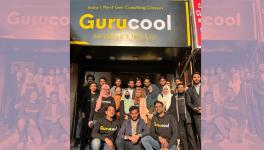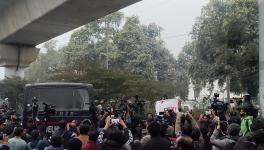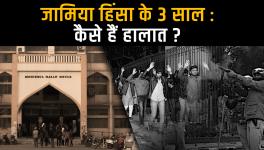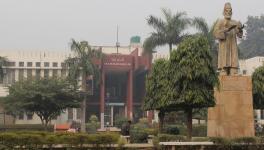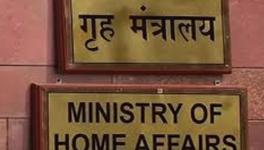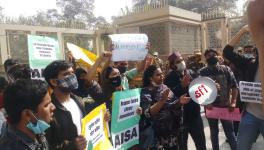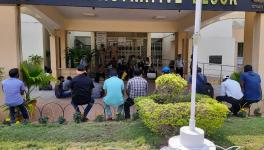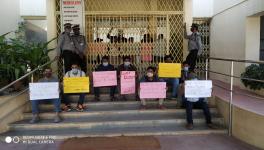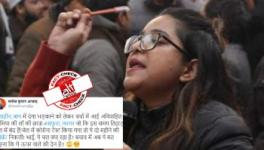In Democratic India, an Undemocratic University Is Being Created, Say Jamia Students
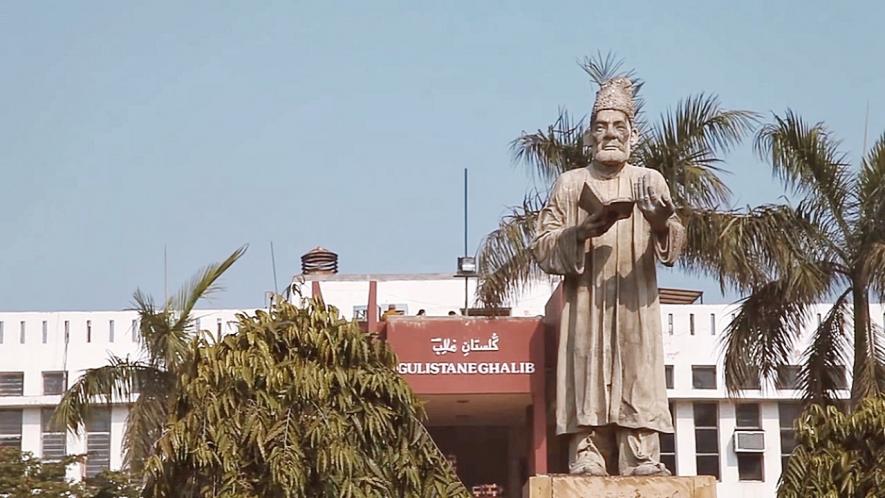
Image Courtesy: First Post
Standing tall in the campus of Jamia Millia Islamia (JMI), famous poet Mirza Ghalib’s statue reminds of a couplet from one of his poems— “bazicha-e-atfal hai duniya mere aage, hotā hai shab-o-roz tamāshā mere aage (the world is a children’s playground before me; everyday, this theatre is enacted before me)”.
The university was established 1920 with an aim to impart progressive education and nationalistic ideals to the students. It became a central university by an act of Parliament in 1988.
Students cannot attain political maturity by merely focusing on the events off campus. By debating and agitating on issues, students create a space that helps them develop skills to influence, mobilise and lead people. The case of Jawaharlal Nehru University is a perfect example. That, however, is not the case with Jamia Millia Islamia.
The university, which boasts, and rightly so, of a rich history of student activism during the freedom movement sadly remains indifferent to political activity by students. However, given the unrest in the campus recently and in the past, what becomes clear is that the university is denying, if not muzzling, dissent.
When students stage protests, chant slogans and gherao their Vice Chancellor’s office and other senior administration to press them to listen to their grievances, they face brutal repression. They are manhandled and beaten up by university guards, proctorial staff and “hired goons”. When all these tactics of curbing dissent fail, the police are called.
Also read: Student Strike Swells at Jamia as MPs Join, VC Surrounded, Police on Campus
But the “arrogant” administration of the varsity does not bear the pain to negotiate and resolve the stalemate. It was recently witnessed while the students were on a sit-in protest since October 14, which started against the participation of Israel as partner in a seminar titled ‘Global Health Zenith Confluence, 2019’ organised by the Faculty of Architecture and Ekistics on October 5.
Five of the protesting students were served show cause notices for their symbolic protest against the involvement of Israel in the seminar. “An hour after the protest began, security guards picked up two of the protesters who were taken to the proctor’s office in the proctorial van. They were beaten and locked up. A few students went to the proctor’s office and requested the release of the students but the staff reportedly paid no heed. This angered the students which resulted in a scuffle. Two male students who were involved in an argument were slapped and pushed to the ground, while two girls were ill-treated. All this happened in the presence of authorities,” alleged an eyewitness.
Agitated by the authorities’ behaviour, the students tore the show cause notice and burnt it in protest, demanding the withdrawal of these notices.
But the administration allegedly chose to “hire goons”—an allegation rubbished by the varsity—comprising some pro-administration students and outsiders to attack the peaceful protesters on October 22.
Several students suffered injuries, with one of them admitted to the nearby Holy Family Hospital’s Intensive Care Unit (ICU) with serious injuries. When the number of striking students swelled up and situation began slipping out of control, the administration—instead of talking to students—called the police to step in and disperse the protesters. However, the cops maintained restraints and did not launch any crackdown. Rather, they initiated negotiations between the agitating students and the varsity’s administration and ensured a resolution for the issues.
The attackers did not spare anyone who had come to the administrative complex of the university in solidarity of the striking students. Three women from different departments alleged that they were hit with belts, molested, their hands were grabbed and they were dragged on the floor.
“We were not even part of the protest. We had come to the administrative block to extend our solidarity. As the protesters began getting attacked, one of my friends and I took out our cell phones and started filming the incident for record. When one of the goons spotted us recording the incident, he hit us with a belt and grabbed me by my hand with an aim to snatch my phone. I kept it inside my clothes. Even then he did not stop. He dragged me on the floor. When we requested the university guards to intervene and save us, they replied, ‘What can we do?’,” said Ladeeda Farzana, a student of BA Arabic.
Her friend Aysha Renna questioned, “The VC (Najma Akhtar) had said after taking charge that she will make the campus more friendly for women. I want to ask her is this how she will ensure safety and security of women in the campus.”
Also read: Jamia Students’ Strike Continues Despite Violence, Apology Demanded from Administration
“The students were protesting against the presence of an Israeli diplomat in the conference. Our protest was genuine as Israel’s hands are soaked with the blood of innocent Palestinians. Instead of giving assurance that it won’t happen in the future, the university tried all dirty tricks to curb the dissenting voices. The hired goons were used as a last resort. It is shameful,” she added.
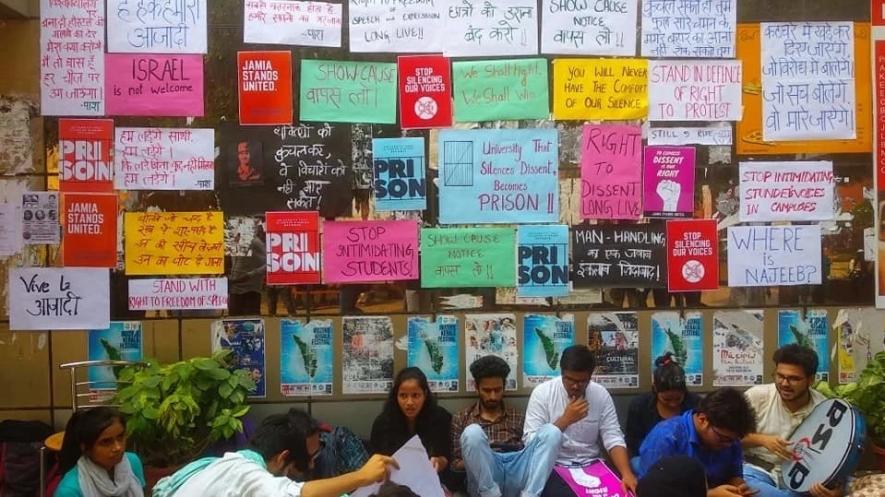
Sumedha—one of the five students who were served the notice — said the chief proctor raised the question as to why they had not taken permission to protest. “It is our campus. Why will we seek permission to hold a protest? The designated place for protest is in a corner of the university, which is not even visible from outside. Why does the government expect us to stage protest at a place where it goes unnoticed. We claim to be a democratic country where we have right to dissent. The Constitution guarantees fundamental rights and duties. Where is our freedom of speech? Why is every opinion that is not in alliance with that of the authorities challenged?,” she asked.
Terming the allegation “baseless”, Jamia PRO Ahmad Azeem said, “Show cause notice to five students were issued for indiscipline and they were asked to reply to the notice. Instead of replying, they burnt the copies of the notice and also boycotted the disciplinary committee where they had the opportunity to present their case. A number of meetings of protesting students with university authorities, Jamia Teachers’ Association and Jamia Alumni Association were held. Protesting students were asked not to disturb academic environment and create law and order situation in the campus.”
He went on to allege that, “A group of students backed by some student organisations gheraoed the VC’s office, laid siege to the office complex and physically blocked all exit gates. A group of senior teachers and officials of the university met the agitating students and listened to their concerns patiently and requested them to end the siege. Teachers also assured them that their demands given in the memorandum will be discussed at the highest level but they refused. They were also requested to send their representatives for talks, but it was also refused.”
“A number of delegates who were attending a conference organised by English department (on October 22) were also not allowed to go out of the main administrative complex. Teachers requested the students to allow the delegates to leave, but they refused. When volunteers of the English department tried to help the delegates to move out of the campus, the protesting students physically stopped them. A scuffle broke out between the two group of students. The protesting students damaged vehicles parked in the complex where they had laid siege,” he claimed.
But the video footage of the incident does not corroborate the allegation. A group of students were clearly seen in the video clip attacking the protesting students with punches, belts and flower pots. The university preferred keeping mum on actions to be taken— if at all—against the attackers.
The students, too, rubbished the university’s allegation, adding that the authorities are issuing false statements and planting stories in the media to discredit them. “The video footage of the incident is circulating everywhere. Anyone can decide who indulged in the violence and attacked. The university is trying to save its goons by making such statements,” said a student, who was not part of the protest and wanted to remain anonymous.
Also read: Jamia Students Go on Dharna Against Show Cause Notices Served to 5 Students
The stalemate was finally resolved after the administration agreed to four of the seven demands put forward by the students and the protesters called off their strike on October 22 evening. The university has also agreed to pursue legal action against the assaulters. “The police have already received the complaint lodged by the students and initiated legal action. We have just received the complaint against the persons accused of assaulting students on the eve of October 22, 2019, and we assure strict actions against the alleged persons. Just now we have received the statements of all five students, accordingly we will withdraw the show cause notice issued to the students. We will not take any disciplinary/legal/academic action against the protesting students who participated in the protest since 5th October, 2019 till today (October 23). We assure that if any Israeli delegate participates in any programme, we will not allow,” read a note of demands and point-wise resolution signed by the Chief Proctor and eight students, with a seal of the Chief Proctor’s office.
NOT ISOLATED INCIDENT
This incident cannot be seen in isolation. Such attempts have been made on previous several occasions as well when students’ protests against different issues were curbed by using force during the tenure of then VC Najeeb Jung.
The university does not have a students’ union. Elections for a students’ body have been banned since March 2006 after a section of students allegedly “started interfering with the administrative matters of the institution”. “The students’ union was vitiating the academic and administrative atmosphere of the varsity and hence the poll process had to be suspended to ensure that there was no disruption in normal academic transactions,” said an official of the university, who wished to stay anonymous.
But the students are demanding to reinstate their union. They say it is ironical that a university with such a rich heritage has no democracy or voice of dissent left on its campus. After being ignored by consecutive vice chancellors and the University Grants Commission, three students had challenged the varsity’s directive in the Delhi High Court in 2011 and the matter is still pending.
First banned in 1996, the elections of Jamia Students’ Union were held in December 2005 when noted scholar Mushirul Hassan was the vice chancellor. Few months after the new union was elected, it was dissolved. Since then, the union office in the campus has been closed. In July 2012, Najeeb Jung had ruled out any possibility of a students’ union election stating that “there have been no such elections for the last four-five years. I have not studied the background of unions here”.
The students allege that their democratic rights are being curtailed and there is just one-way communication between them and the administration. They demand that instead of eliminating the whole process, the varsity should at least allow political activism among students, in a manner that does not affect academic activities.
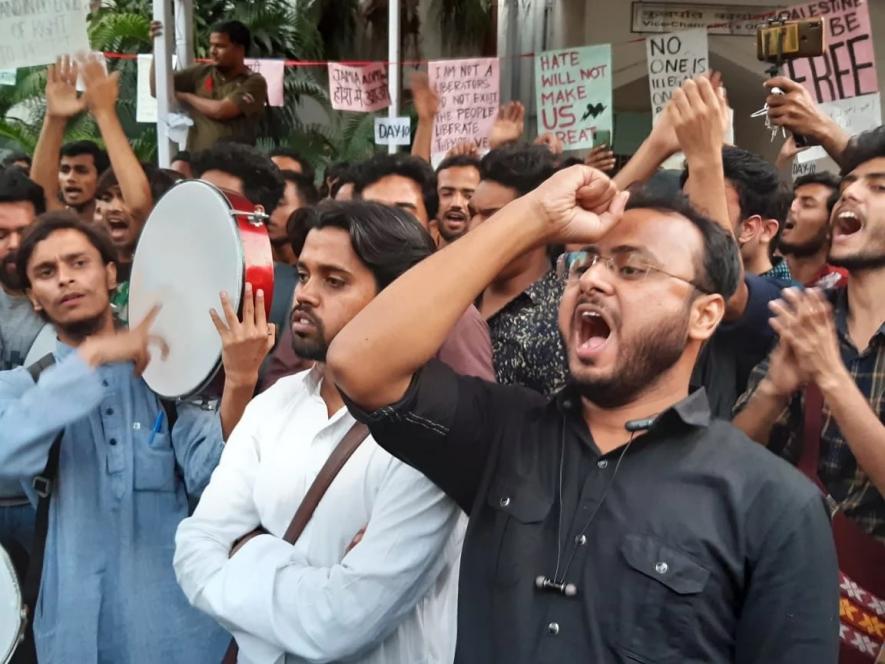
“Students’ union gives a common platform to students in colleges and universities to fight for common interests. But it has been a decade now and on the pretext that a case is pending in court, the university administration has stopped union elections. Consequently, students here find themselves on weaker ground against the authorities,” said a former student, who is now teaching in a university in West Bengal.
Interestingly, Jamia has strong union of teachers and non-teaching staff.
“Except probably a brief period of the then VC, late Professor Mushirul Hasan, Jamia does not really have a thriving culture of protest. The administration has always been suppressive of any defiance. We have the instances when letters were sent by authorities to students’ guardians for participating in protests. In the last decade, I hardly saw any real mobilisation of students for a common cause. Even when the Occupy UGC movement (launched in October last year in response to a recommendation for scrapping the non-NET fellowship) was going on, the collective participation of Jamia students was minimal,” he said, adding that the “argument that students should focus on studies and leave politics is hilarious and shows the ignorance at best and unyielding attitude of the authorities at worst”.
Universities have always been the cradle for future leaders and it is here that they sharpen their skills. A large number of politicians had their training in politics in universities.
Also read: Crisis in JNU Deepening and It's Hurting Academics, Say Students
Asad Ashraf, an ex-student of the university who has completed Masters in Peace and Conflict, said every vice chancellor of Jamia has “killed its democratic aspiration” during his tenure. “I was myself suspended for demanding a students’ body on the campus and questioning the authoritative ways of the administration. There is no students’ body despite the Lyngdoh Committee recommendations (which was set up by the then UPA government in December 2005 in response to a directive by the Supreme Court and had stipulated that all institutions of higher education, both private and public, should conduct student union elections every year). Vice Chancellors, citing administrative reasons, act at the behest of the central governments and do not want leaders to prosper among a large chunk of minority students studying here,” he alleged.
According to Meeran Haider, a research scholar of the university, an undemocratic university is being created in a democratic country. “The consecutive administrations of the university have always tried to please and ingratiate the respective governments for personal benefits, betraying the vision of the founding fathers. In a nut shell, you can say in democratic India, an undemocratic university is being created,” he said.
“What would have happened if a JNU-kind incident (the February 9, 2016 incident and the following attack on the university) had occurred in Jamia?,” asked Haider, who was previous co-convener and spokesperson of Jamia Students’ Forum (JSF), which is fighting for restoration of campus democracy. “Perhaps, the institution would have been shut down by now and it would have turned into a war zone,” he said, concluding, “a community which has no participation in national politics and administrations ends up becoming slave and the same is happening with us.”
Syed Laraib Neyazi, a student of the varsity, said the problem lies among the “so-called guardians of Jamia itself”. “They see the university as a launch pad for their own political ambitions. Student politics will pave the way for an assertive Muslim intelligentsia. And that would hamper their personal ambition,” he said.
He said every society and nation has meaningfully prospered when it allowed each of its members to participate democratically.
Sharing the same view, Hamraj Singh, who has pursued MA in Media Governance, said an educational institution does not only teach us theoretical aspect of socio-political issues but also to practice them. “Jamia should restore students’ democracy. It will make the atmosphere more vibrant in and around the campus,” he said, voicing concerns over whether “the student union will be able to keep itself above minority politics”.
Syed Danish, a former student of the university, asked the Jamia administration to take a lesson from JNU on what role the campus plays in the political education of a student.
“Replaying the entire episode of what happened in Jawaharlal Nehru University in the past one month, one wonders what lies in the spirit of JNU. To be precise, how do we build a university which has a gallant history of taking a non-conformist stand in the face of the most oppressive of governments? How do we build a university which can inspire and educate its students to face existential threats from all sides and never surrender?,” he added.
Get the latest reports & analysis with people's perspective on Protests, movements & deep analytical videos, discussions of the current affairs in your Telegram app. Subscribe to NewsClick's Telegram channel & get Real-Time updates on stories, as they get published on our website.









